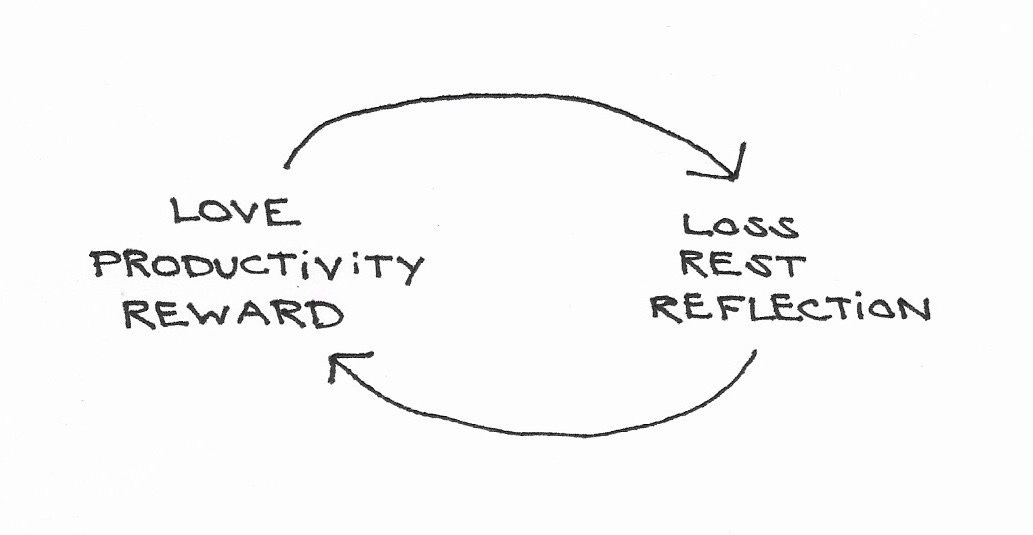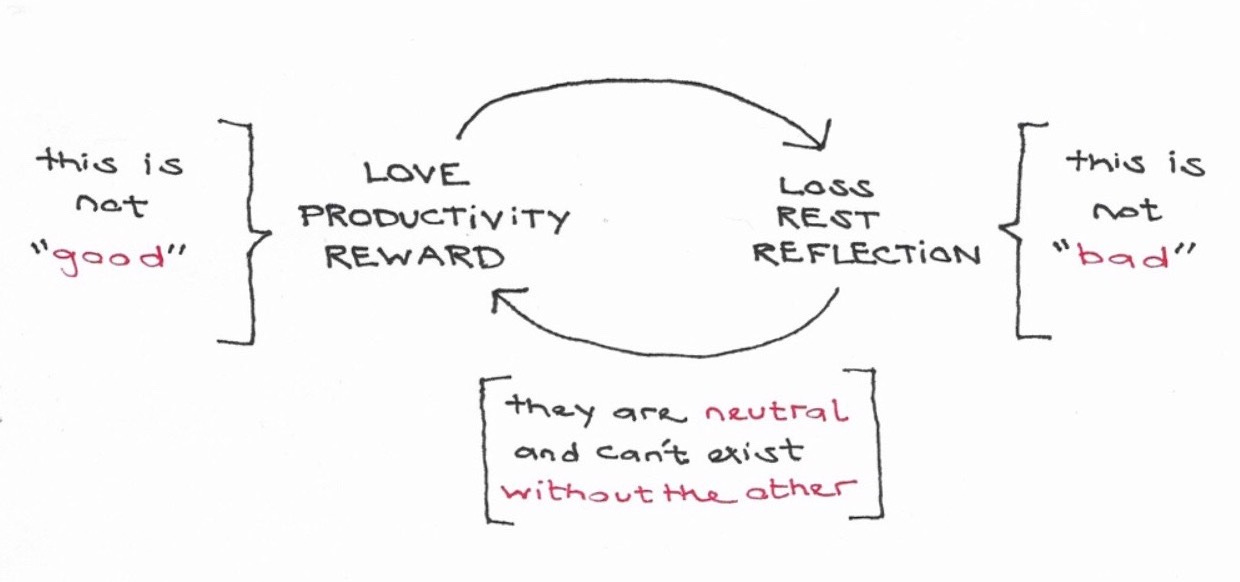The moment I knew I was going to quit my job was when my boss warned me that writing about grief would interfere with my professional career.
I believed that I could do both things at once—grieve openly and be good at my job—but she didn’t see it that way (or, at least, she worried that other people wouldn’t see it that way). I knew then that if I had to choose between the two, I would choose grief.
And so I did. Months after that conversation, I put in my notice. I left my position at the end of 2017, deciding to give myself time to better process the loss of my husband and figure out what I wanted to do next. I’d saved up money in order to take time off from work, but still, I knew I was taking a risk. Stepping away from a stable job and a successful career, with no clear idea of what was ahead, was an unconventional and scary thing to do. It’s a decision that I’m certain others doubted. For me, though, it felt like the right move: I chose grief over my career because I saw an opportunity to better know myself and help others along the way.
I don’t fault my former boss for her advice; I think it was well-meaning. In the end, I’m glad she inadvertently pushed me in this direction. By accepting and understanding, and, yes, even befriending grief, I have enriched my life in countless ways.
What I didn’t realize at the time was that, in choosing grief, I also chose joy.
I would not be where I am today without the time I spent grieving, resting, and reflecting. The grieving I did allowed me to open up my heart again and to fall in love with someone new. The resting I did gave me the energy to be productive, and to create things like this newsletter. The self-reflection I did—work that is often painful and humbling—sooner or later has transformed into reward.
Loss and love, rest and productivity, reflection and reward are all part of an ever-moving cycle. This is hardly a revelation; our entire lives are a circle, and everything we experience is temporary. What is notable, though, is how often we forget about this pattern—or, at least, how often my sweet dumb brain does.
I think that’s because we tend to see only the “good” side of the cycle in others. Social media is filled with people’s snapshots from vacations; announcements about career wins, engagements, weddings, and births; and nothing but the most flattering selfies. Only with your closest friends do you get the full picture of how things really are—more often than not, others will share that things are “fine,” or that they “can’t complain!” (yes, even now, in a freaking pandemic). It’s easy to assume that everyone else is skating along in their lives, somehow managing to stay happy and be productive, because that’s the side of things that we most often view from the outside.
Meanwhile, we experience both sides of our own cycle. Because our brains are hardwired to focus on the negative, we tend to overestimate how much time we’re spending on the “bad” side of things, or how long we’ll be there. Instead of recognizing that love and loss go hand in hand, we view the endings of our relationships as failures. Rather than enjoying a period of rest, we berate ourselves for being lazy. And we discount the reward that comes from deep self-reflection—opting to distract ourselves and dull the pain in lieu of sitting with our emotions.
No wonder we feel stuck sometimes.
It might seem like your favorite writer, musician, or artist is always on top, producing incredible work after incredible work. Or that acquaintance of yours may somehow seem to be consistently succeeding, jumping from one great job to the next and boasting an endless stream of wins. That’s because we only see the highlight reel. Those folks are choosing to share solely their accomplishments, which is fine; it’s important, though, for us to acknowledge that their highs wouldn’t be possible without lows. They are human like us. If we experience ups and downs, they do too.
The truth is that the ups can’t exist without the downs. Loss isn’t failure. It’s part of love. Rest isn’t weakness. It makes productivity possible. And reflection isn’t surrender. It creates room for reward.
Like loss, rest, and reflection, grief lives on the “bad” side of this cycle—the side of things we don’t share about as openly, but are equally deserving of discussion. That’s exactly why I’m drawn to it. Grief, like those other hard experiences, isn’t inherently bad. It’s neutral and natural, and it’s something we could all benefit from understanding a whole lot better.
Unfortunately, we don’t talk or write about grief as much as the lighter things in life. People feel shame about grieving—Have I been mourning for too long? Am I not mourning enough? Why does this feel so lonely?—and stay silent about their experience. And thus another cycle is born: Because we don’t talk about grief, we feel alone in our grief, and because we feel alone in our grief, we don’t talk about it.
By working to accept, learn, and be more transparent about grief, I have understood how common it is. Having a better understanding of grief has helped me to take a more grounded approach to the unique challenges of this period we’re living in. It’s helped me to be a better friend to people I love who are experiencing their own tough times. I have no doubt that, in a few short months, my grief wisdom will also help me to be a better parent.
In the end, choosing grief didn’t hurt my career. You can argue that the choice didn’t necessarily help it either—what I lost in salary, I’ve gained in fulfillment. But the choice did alter the direction of my life. If I stayed in a corporate job, I wouldn’t be writing this newsletter today. I’m not even sure that I’d be in my current relationship. I’d be a different person, living in a different timeline.
I’m glad I chose grief. I’m glad I chose to not be afraid of the “bad” side of the cycle, and to stop viewing that side as something to be ashamed of. What I ultimately chose was to listen to myself—something I always want to do in life. And if I’ve helped people along the way, then it was undoubtedly a choice worth making.
xoxo KHG
It’s a milestone!
One year ago, I announced that I was introducing paid subscriptions to My Sweet Dumb Brain.
Since then, I’ve gained a few hundred paying subscribers, more freedom to write, and a ton of confidence. I’ve published 48 essays and 31 subscriber-only posts in the past year, totaling somewhere around 80,000 words. I’ve reached thousands of new readers. And I’ve received dozens of heartfelt emails that I stash away in a special folder and revisit whenever I need to remember why I created this newsletter in the first place.
It’s been a beautiful journey, and I am immensely grateful for it. Thank you to everyone who has invested in this newsletter; it truly means so much to me!
A lot has changed in a year (what an understatement!), and I’ve adjusted subscription rates as a result of the instability so many of us are experiencing. I’m trying to strike a constant balance: to make my writing as accessible as possible, while also valuing the time and effort I put into it.
A yearly subscription to My Sweet Dumb Brain is now $35.00/year (formerly $50.00). The monthly rate is still $5.00/month. If you’re feeling especially generous and are in a financial position to pay more, you can become a Founding Member of this newsletter. The Founding Member level is pay-what-you-can, starting at a suggested rate of $75.00.
I hope that these tiered options will give readers more flexibility in figuring out what level of support works best for them. And don’t worry—weekly essays, like today’s newsletter, will always be free.
Thank you for making this past year such a rewarding one! I wouldn’t be doing this without you.
My Sweet Dumb Brain is written by Katie Hawkins-Gaar. It’s edited by Rebecca Coates, whose four-year-old daughter just gave her a sticker and called her a “good worker.” She’s a tough boss, but a kind one!
Want to support this newsletter? You can subscribe, tell a friend about it, send some monetary gratitude via Venmo (@Katie-Hawkins-Gaar), or hit the heart button at the top of this post. It all helps!







Thanks so much for this. I really needed to hear it. As soon as I'm back on my feet with a new job, I'll subscribe, I promise. :) I'm so glad that you listened to your heart.
Thanks so much for your honesty here, Katie. Holding space for your own grief is deeply powerful, especially in this landscape of self-denial and overwork, and I'm inspired by your choice! If everyone honored their own needs in this way, I believe we'd live in a kinder, more compassionate and interconnected society.
I also left my successful corporate career at the end of 2017, and while it was for very different reasons on the surface, it was essentially the same: To listen to myself. Though I've also struggled since in some traditional, "success"-related ways, I've also grown creatively and found a deeper sense of meaning and fulfillment.
Thanks for the camaraderie on that -- it was validating to hear it is working out, for lack of a better word, for someone else -- and for sharing your story here.